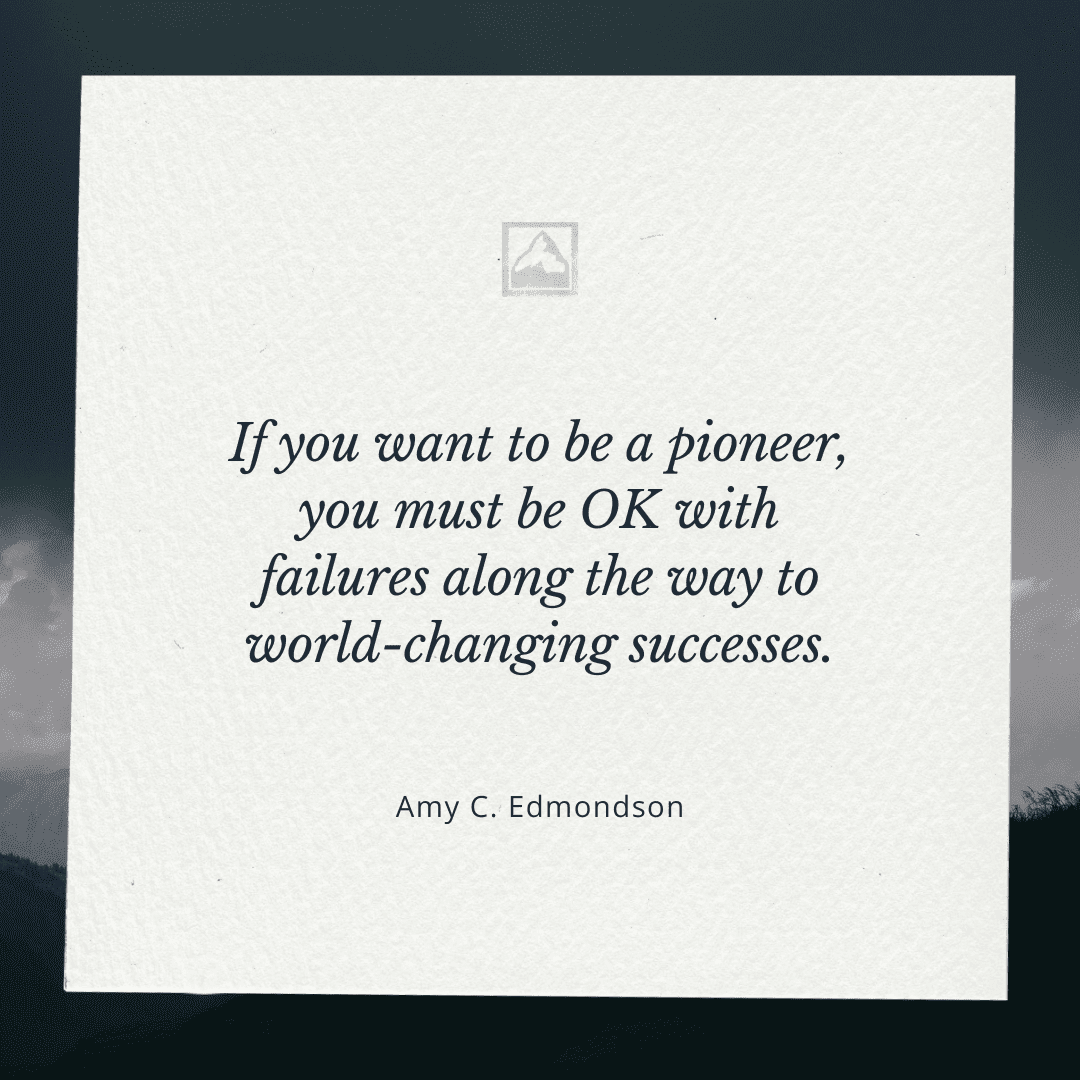
If you want to be a pioneer, you must be OK with failures along the way to world-changing successes.
—Amy C. Edmondson

If you want to be a pioneer, you must be OK with failures along the way to world-changing successes.
—Amy C. Edmondson

By Amber Van Schooneveld
In my twenties, awash in the hope of youth, I never felt like a failure. In my thirties, I was too distracted by the hurricane that is raising young children to contemplate failure. But in my forties? It’s awfully easy to look around and notice that everyone seems to be further ahead than me. Kelly’s got a second home in Florida. Adam’s got “V.P. of Marketing” after his name. And Jenny’s still in the best shape of her life.
When I measure my worth by superficial metrics of success, I can fall into the pit of feeling like a failure. Maybe, if you clicked on this article, thoughts like, “I feel like a failure” have snuck in the backdoor of your mind. Or maybe they’ve fully moved in and are parked on the couch, feet up, eating Cheetos and glaring at you.
Reflecting on where we are and where we want to go is a good thing. But parking our minds in the pit labeled “failure” never is. Here are some practical steps to climb your way out of that pit when you feel like a failure.
 Invite a friend in.
Invite a friend in. Sometimes, we project confidence around others, but whisper “I’m a failure” when we’re alone. Don’t go this alone. Talk to a trusted friend. Tell them how you’re feeling, and if they’re a friend worth keeping, they will let you know that you are definitely not the only one who has ever felt this way. They’ll offer you a counter-perspective on yourself. And you know what? Sometimes simply speaking the thing we fear out loud takes away its power.
Do you need to talk? If you are facing mental health struggles or emotional distress, call the 988 Suicide & Crisis Lifeline. Just dial or text 988 or chat here. Conversations are free and confidential.
Step two: Replace the sentence “I feel like a failure” with one that doesn’t internalize failure or label yourself. It’s OK to be honest and say, “I failed at this relationship” or “my start-up failed,” but don’t allow these outward measures to define your being. When you find yourself muttering the phrase, “I’m a failure,” stop yourself right there, rewind and replace that message with a more accurate one that doesn’t conflate your success, or lack thereof, with your identity.
If you’re feeling like a failure, you might have confused your internal value with the outward trappings of success. Your intrinsic worth does not come from your salary, title or material possessions. Your value as a human being is immutable. I don’t know what you believe, but I believe — and those of us at the Global Leadership Network believe — that you have inherent, God-given value that does not increase or decrease based on what you do or achieve. You are valuable and worthy. Full stop.
Now that you have been reminded that your success doesn’t define your worth, define what success does mean to you. (Here’s a hint — it doesn’t have to mean a hot bod and a Mercedes.) Instead of focusing on the external signals that evoke the envy of others, contemplate what brings you true fulfillment and joy. Is it a healthier relationship with your partner? Is it making a meaningful impact on the world around you? Get other people out of your head and explore what will bring you true fulfillment.
Next up, set a goal. Take your nebulous feeling of failure and transform it into a tangible goal you want to aim for. Maybe you want to build more muscle mass in the next six months. Or finally go for that degree. Determine the specific steps you need to take to meet that goal and break them into achievable, measurable steps. Then make a plan. Write it down and tell that friend we talked about earlier.
If your inner monologue is a bully (“I’m a failure”), it likely won’t go away on its own, regardless of how much you goal set. Instead, you must intentionally write a new story to replace your old ones. Listen to the things your inner bully says. Write them down. Then cross them out and write the narrative you want to replace them. Does your current script say, “I never follow through”? Tell yourself instead, “I am capable.” Become a storyteller to yourself. This isn’t wishful thinking — or if it is, it works, as the stories we tell ourselves tend to come true.
You might think practicing gratitude sounds saccharine and sentimental. But it’s scientific. According to Harvard Medical School, gratitude “helps people feel more positive emotions, relish good experiences, improve their health, deal with adversity, and build strong relationships.” When you examine that inner monologue of yours and notice that it’s telling you how lame you are compared to Suzy, stop and redirect that thought toward gratitude. Instead, contemplate the things or people you are so glad are in your life. Write a note to someone you are thankful for. Keep a gratitude journal or simply say a prayer of thanks.
Remember that failure is an inevitable part of life. Things will not always go as you hope. And especially if you are an ambitious person with goals, you’re going to experience failures along the way.
Feel the disappointment, but then get back up. Keep going anyway. Call a friend. Speak good stories to yourself. Reject your self-imposed labels and remember where your worth comes from.

By Amber Van Schooneveld
At the Global Leadership Network, we are obsessed with leadership. Each year, we have the tremendous privilege of hosting the world’s top leadership thinkers at the Global Leadership Summit. And year round, we soak up the latest insights, trends and research on leadership, while always returning to the seminal works that first sparked our leadership journey. So, we asked our staff: What are the best leadership books you’ve ever read? And here’s what they had to say.
Of course, any list of this type is subjective — but these are the books that made a fundamental difference for the leaders at the Global Leadership Network. We hope this list helps you discover your next leadership epiphany!

Published nearly a century ago in 1936, the truths contained in Carnegie’s book are simple but timeless. “How to Win Friends and Influence People” helps you learn how to make people like you, how to win people to your way of thinking and how to change people without arousing resentment. Critics have said the book teaches people how to be manipulative, but it heralds wisdom such as: be sincere, listen well, respect others’ ideas and make others feel important — and those are things we can get behind.
We think this is one of the greatest leadership books of all time because it created the modern framework of winsome and sincere leadership.
“This book gave me life lessons that taught me to always put people first.” — Krista Budzisz, Global Leadership Network, Women Leaders Network North American Cohort Director

Originally published in 2001, “Good to Great” coined the term “Level 5 Leader.” For five years, Jim Collins studied organizations that made the leap from mediocre to great. What he found shocked him and his team: The leaders that transform their companies have a surprising combination of personal humility and dogged determination.
We think this is one of the top leadership books of all time because it champions both humble and hungry leadership.
“Jim’s book taught me that character and humility are the key to organizational health and growth.” — Dave Thornton, Global Leadership Network SVP of Church and Marketing Engagement

Brené Brown has spent decades studying courage, vulnerability, shame and empathy. In writing “Dare to Lead,” she conducted new research with leaders, change makers and culture shifters. She writes about the four skill sets a leader must possess to lead courageously: rumbling with vulnerability, living into our values, braving trust and learning to rise.
We think this is one of the best leadership books of all time because it combines research with practical tools to help teams grow deeper together.
“Our team worked through ‘Dare to Lead together.’ It helped empower us to rumble with vulnerability, live into our values and trust more as a team.” — Lori Hermann, Global Leadership Network SVP of Content and Experiences

Another oldie but a goodie, “Crucial Conversations” was originally published in 2002. It helps leaders move from being “nice” — while burying the issues they desperately need to address on their teams — to mastering challenging conversations, “when stakes are high, opinions vary and emotions run strong.”
We think this is one of the top leadership books of all time because healthy candor is indispensable in moving any team forward.
“This book equipped me to create a team culture in which we can learn from one another and challenge one another in healthy, productive ways.” — Amber Van Schooneveld, Global Leadership Network Senior Writer

Originally published in 1978, “The Making of a Christian Leader” by former World Vision CEO Ted W. Engstrom gives readers tested principles of management and human relations. While in some contexts, church and ministry leaders receive the message that all they need to lead well is spiritual depth, this book provides the practical leadership skills needed to lead well in any context.
We think this is one of the greatest leadership books of all time because it brings together marketplace and ministry wisdom, and that’s one of our goals at the Global Leadership Network.
“Ted W. Engstrom’s ‘The Making of a Christian Leader’ prompted me to reevaluate my leadership through the lens of spiritual principles, enabling me to lead from a place of accountability and humility.” — Francis Olubambi, GLS West & Central Africa Regional Director

Distinct from other leadership books, Patrick Lencioni’s “The Five Dysfunctions of a Team” is told in the form of a story of a CEO who finds that her new team is highly dysfunctional. Through this “fable,” Lencioni unravels the five behavioral tendencies that make teams struggle: absence of trust, fear of conflict, lack of commitment, avoidance of accountability and inattention to results.
We think this is one of the best leadership books of all time because of its deep wisdom into the nature of teams, along with step-by-step guidance on how to resolve issues in even the most challenging teams.
“I read 5 Dysfunctions early in my leadership journey and fell in love with the way Patrick writes. The leadership allegory pulled me in and gave me a picture of what a healthy team could look like — and that was the kind of team I wanted to lead.” — Lori Hermann, Global Leadership Network SVP of Content and Experiences
 First published 50 years ago, “See You at the Top” by motivational speaker Zig Ziglar focuses on the character development of true leaders: honesty, loyalty, faith and integrity. Ziglar walks you through the “steps” to success, such as healthy relationships, the right attitude and goal setting.
First published 50 years ago, “See You at the Top” by motivational speaker Zig Ziglar focuses on the character development of true leaders: honesty, loyalty, faith and integrity. Ziglar walks you through the “steps” to success, such as healthy relationships, the right attitude and goal setting.
We think “See You at the Top” is one of the best leadership books of all time because, although some of his advice is outdated, his focus on others-centric leadership is a counterpoint to aggressive, self-serving leadership.
“I learned that no matter the leadership context, putting people first and asking how I can serve others always gets us where we want to go!” — Krista Budzisz, Global Leadership Network, Women Leaders Network North American Cohort Director

One of the newer books on our list, “Unreasonable Hospitality” was published in 2022, but we still think it deserves a place on the list of the best leadership books we’ve read. The story of Will Guidara’s quest to make Manhattan restaurant Eleven Madison Park the number one restaurant in the world, “Unreasonable Hospitality” goes well beyond principles of the hospitality industry into the leadership strategies that took his restaurant to number one.
We think this is one of the top leadership books of all time because it teaches leaders the importance of intention, excellence and care through his fun-to-read story.
“The smallest details matter. The minute, whimsical details that many overlook, are the exact details that will make someone feel valued. And when you can make someone feel valued, you create a connection that transcends the work itself. And that is something worth impacting, no matter your field.” — Whitney Putnam, Global Leadership Network VP of Marketing
__________________________________________________________________________________
Are you looking for ways to keep growing in your leadership? One of the best ways to get refreshed, inspired and challenged is to attend the Global Leadership Summit. Held in South Barrington, IL, and in hundreds of host sites around the country, you’ll get fresh, actionable leadership insights from world-class experts.

SUMMARY
Hospitality is one of the most powerful differentiators that an organization possesses, but it can be challenging to create and sustain it across an entire culture. In this episode, cofounder and former president of Ritz-Carlton Hotel Company, Horst Schulze, shares hospitality insights from a legendary career with GLN President and CEO, David Ashcraft. If you’re a leader who is interested in creating a culture of excellence and customer-focused hospitality, we invite you listen in to this rich conversation!
IN THIS EPISODE
LISTEN
Apple Podcasts | Spotify | YouTube
STANDOUTS AND TAKEAWAYS
LINKS MENTIONED
SPONSOR

SUMMARY
It’s not often that you get to listen to someone who has literally been rated the best in the world in their craft, but that is exactly what this episode is about. Under Will Guidara’s Leadership, Eleven Madison Park (EMP) received 3 Michelin Stars, and was rated the #1 restaurant in the world. In this conversation with GLN President and CEO David Ashcraft, recorded live at the Global Leadership Summit, Will shares about the power of hospitality for all businesses and organizations. He also shares some of the leadership principles that created a winning culture at EMP. If you have ever wanted to learn from someone operating at the peak of their profession, this episode is just right for you.
IN THIS EPISODE:
LISTEN
Apple Podcasts | Spotify | YouTube
STANDOUTS AND TAKEAWAYS
LINKS MENTIONED

SUMMARY
What should leaders know about hospitality? What does it mean to be welcoming? Whitney Putnam (GLN VP of Marketing and Global Leadership Podcast Host) and David Ashcraft (GLN President and CEO) kick off this month’s focus with a focus on the importance of hospitality. In the conversation, David reflects on the impact hospitality can have on guests and/or customers, and how showing unreasonable hospitality to others can positively impact a team.
IN THIS EPISODE:
LISTEN
Apple Podcasts | Spotify | YouTube
STANDOUTS AND TAKEAWAYS
LINKS MENTIONED
“We welcome and encourage comments on this site. There may be some instances where comments will need to be edited or removed, such as:
If you have any questions on the commenting policy, please let us know at heretoserve@globalleadership.org”
Recent Comments